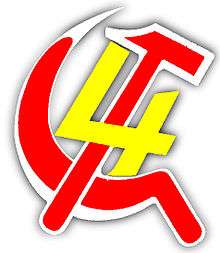International Workers League – Fourth International

| Part of a series on |
| Trotskyism |
|---|
 |
| Concepts |
| Key Trotskyists |
| Internationals |
|
|
| Branches |
| Communism portal |
The International Workers League (Fourth International) or IWLfi (Spanish: Liga Internacional de los Trabajadores (Cuarta Internacional) or LITci; Portuguese: Liga Internacional dos Trabalhadores - Quarta Internacional or LIT-QI) is a Morenist Trotskyist international organisation.
Overview
The group's origins lie in the International Committee of the Fourth International (ICFI). Moreno's supporters followed the American Socialist Workers Party in leaving the ICFI in 1963 to form the reunified Fourth International (USFI).[1] In 1969, the USFI voted to support guerrilla war in Latin America. Moreno's group opposed this.[2] It was reduced to sympathiser status.
While critical of the Sandinistas, Moreno's group sent a Simon Bolivar Brigade to Nicaragua to aid the Civil War,[3] with the aim of building a revolutionary party there. This brigade was opposed by the reunified Fourth International[4] because it operated outside the discipline of the FSLN;[5] the only other Trotskyists to participate were Pierre Lamberts' Organising Committee for the Reconstruction of the Fourth International. Forty non-Nicaraguan members of the Brigade were expelled from the country by the FSLN.[6] Almost immediately, Moreno's and Lambert's tendencies joined to form the Parity Committee for the Reconstruction of the Fourth International.[7] However, Moreno's supporters withdrew in 1981[8] complaining that Lambert had links to trade union bureaucrats, and in 1982 formed the "International Workers League (Fourth International)". In addition to their former supporters, this also attracted groups in Peru and Venezuela which split from the Lambertist currents.
The group campaigned for the victory of Argentina in the Falklands War, for the non-payment of foreign debt, and for the "defeat of imperialism in the Gulf War." In the mid-1990s, it helped launch Workers' Aid to Bosnia and began working with the Workers International to Rebuild the Fourth International, although that group is now inactive.
Disagreements following the death of Moreno led several sections to leave the international, while others split. Those who left founded the International Centre of Orthodox Trotskyism (CITO in Spanish). The majority of this group rejoined the International Workers League in 2005, the minority forming the International Socialist League.
The LITci publishes the bulletin International Courier (Correo Internacional) and the journal Marxism Alive (Marxismo Vivo or Le Marxisme Vivant), both in various languages, principally Spanish.
Sections
- United Socialist Workers' Party (Argentina)
- Communist Workers' League (Belgium) - Sympathizing Section
- Socialist Struggle (Bolivia) - Sympathizing Section
- United Socialist Workers' Party (Brazil)
- Communist Left (Chile)
- Socialist Workers Party (Colombia)
- Workers' Party (Costa Rica)
- Movement for Socialism (Ecuador) - Sympathizing Section
- Socialist Unity of Workers (El Salvador)
- Socialist Workers Party (Honduras)
- Communist Alternative Party (Italy)
- Workers Socialist Group (Mexico) - Sympathizing Section
- Workers For Socialism League (Panama) - Sympathizing Section
- Workers' Party (Paraguay)
- Socialist Workers Party (Peru)
- Socialist Alternative Movement (Portugal)[9]
- Internationalist Workers Party (Russia) - Sympathizing Section
- Senegal Popular League (Senegal) - Sympathizing Section
- Corriente Roja (Spain)
- Red (magazine) (Turkey) - Sympathizing Section
- Ukrainian Communist Workers Union (Ukraine) - Sympathizing Section
- International Socialist League (UK) - Sympathizing Section
- Workers Voice/La Voz de los Trabajadores (United States) - Sympathizing Section
- Socialist Left of the Workers (Uruguay) - Sympathizing Section
- Socialist Unity of Workers (Venezuela) - - Sympathizing Section
Notes
References
- Alicia Sagra, A Brief Outline of the History of the IWL
- Alexander, Robert J. (1991). International Trotskyism, 1929-1985: A Documented Analysis of the Movement. Duke University Press. ISBN 0822309750.
- Lisi, Marco (2013). "Rediscovering Civil Society? Renewal and Continuity in the Portuguese Radical Left". South European Society and Politics. 18 (1): 21–39. doi:10.1080/13608746.2012.757450. Retrieved February 18, 2014.